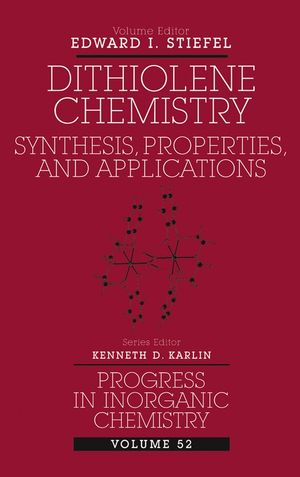Dithiolene Chemistry: Synthesis, Properties, and Applications, Volume 52ISBN: 978-0-471-37829-7
Hardcover
752 pages
December 2003
 |
||||||
"…a balanced and comprehensive treatment of incontestable currency and utility…a primary, and possibly indispensable, resource." (Journal of the American Chemical Society, August 11, 2004)
“…an extremely useful addition…” (Applied Organometallic Chemistry, Vol 18, No 8, August 2004)
"The editor, Dr. Edward Stiefel, has impeccable credentials. You could not find a better person to serve as editor. He is very well known, in fact renowned among inorganic chemists. Moreover, he is highly efficient and should prove pleasant to work with. Last, but not least, his knowledge of chemistry and its denizens is voluminous."—Dr. Marc Walters, New York University, Department of Chemistry
"This book would serve an important need."
—Dr. Stephen Koch, SUNY Stony Brook, Chemistry Department
"Dithiolene metal complexes have a history going back to the
1960's (at least). But, interest in such compounds faded by the
seventies. However, there has been a major resurgence, just in the
last very few years, and a number of research groups have found
exciting new properties (i.e., photochemistry, luminescence),
applications as sensors and new materials of industrial interest.
Moreover, very recent (in the last five years, or less) biochemical
insights have revealed that dithiolene-metal complexes exist in
nature, in certain enzyme active sites. Thus, a segment of the
biochemical and (bio)inorganic chem istry community is currently
devoting considerable attention to inorganic synthetic, theoretical
and other aspects of dithiolene coordination chemistry."
—Dr. Kenneth D. Karlin, Editor of Progress in Inorganic
Chemistry, and Chemistry Professor at John Hopkins University
"Overall, I am quite enthusiastic about the proposed book on
dithiolenes. This is an active research area, and I have long been
curious that there is not monograph on the subject."
—Dr. T.B. Rauchfuss, University of Illinois,
Urbana-Champaign



